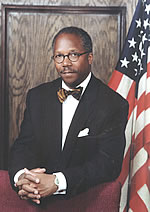Ambassador Charles Stith on economics for the African Disapora

It was recently announced that Ambassador Charles Stith would come on the board of directors for BankBlackwell, the first federally funded African American Internet Bank. BankBlackwell CEO James Mundy is enthusiastic about this move because Stith "will bring a wealth of financial, business, and community leadership" to the Board. Stith has a long track record of not only providing economic opportunities for African Americans, but also for Africans.
Ambassador Stith is currently the Director of the African Presidential Archives and Research Center at Boston University. He is a former United States Ambassador to the Republic of Tanzania. In 1994, prior to appointing Stith Ambassador to Tanzania, President Clinton appointed Reverend Stith to the official delegation to monitor the South African elections. In 2001, former Senate Majority Leader Tom Daschle appointed him to the U.S. Commission on International Religious Freedom. At one time he was also the Senior Minister at Union United Methodist Church.
Prior to his international duties, he was also the founder and former national president of the Organization for the New Equality (ONE), a nonprofit organization with the goal of generating economic opportunity for women and people of color. During his tenure at ONE, he is best known for helping to negotiate and broker the first comprehensive community reinvestment agreement in the country. The agreement committed Boston financial institutions to $500 million in mortgage and commercial lending to low and moderate and minority communities in Massachusetts.
"The rationale of getting involved back then [with ONE] is the same as supporting what the Bank is about, and that is by definition undercapitalized communities that need access to capital," said Stith. "To grow communities and for members in communities to create and generate wealth, they need access to credited capital. The concert of a national Internet bank is a unique effort to not only harness the capital resources that exist in the African American community. But to develop a mechanism so African Americans that have access to another option in terms of capital credit."
After working with ONE he served on the CRA Regulatory Agency Working Group, chaired by then Comptroller of the Currency Eugene Ludwig. He was one of the masterminds of the regulations redefining the Community Reinvestment Act (CRA), which has resulted in nearly $2 trillion in credit and capital for low income communities and communities of color.
Stith and Mundy recently hosted an investment seminar at Morehouse College in Atlanta. Stith is happy about the reactions to the seminars and is "confident that trips to Atlanta and out to the west coast and around the country will yield a response to not only get off the Bank off the ground but flourish."
Stith’s vast experience in economics extended to his tenure as Ambassador to Tanzania. He took up the Ambassadorship shortly after the August 1998 bombing of the United States Embassy in Dar es Salaam. He took the initiative to set a new standard for U.S. Embassies by promoting US trade and investment in Africa. In September 1999 he organized Tanzanian President Benjamin Mkapa’s historic visit to the United States. This particular visit had the distinction of having the largest delegation of African business leaders to ever accompany an African head of state on a visit to a Western country. He also worked with the Tanzanian government to enable them to become the first Sub-Saharan African country to reach the decision point for debt relief under the enhanced Heavily Indebted Poor Countries Initiative (HIPC). Stith believe that a similar program to BankBlackwell with the use of the Internet would be useful in building better financial structures in many African nations.
"The use of the Internet on the continent is growing exponentially," Stith said. "Most of what you hear about what’s going on in Africa is HIV and AIDS and how it is spreading across the continent. But what is really growing exponentially faster than any problem is the potential of what the Internet has to offer. There is a whole generation that is becoming more comfortable that sort of thing. If this Internet model can work here, it can definitely work on the continent."
Stith says that Americans, especially African Americans, need to recognize that "Africa is more than the sum of its problems" politically, socially and economically. Despite the concerns of AIDS, malaria, poverty and lack of infrastructure, there are many African nations that are stimulating capital flow and economic growth.
"Africa is a place where people in the African Diaspora ought to look in terms of being able to do well by doing good," said Stith. "That is it is an attractive venue to invest and engage in the process of creating economic stability on the continent."
Stith recommends that more fair trade policies be established to help African agricultural workers. "Trade is an incredibly critical piece to Africa’s growth and development," Stith said. "The degree the West subsidizes its farmers makes it difficult not only for African farmers to compete globally, but it is difficult to compete in their own countries. American and European farmers are able to undersell African farmers even in their own countries because of subsidies."
The recent election of Liberia’s Ellen Johnson-Sirleaf, the former UN economic advisor turned first democratically elected women president is Africa, is an example of why African Americans should invest in Africa. "A revolution is happening in Africa, and African Americans need to be a part of it," said Stith.


0 Comments:
Post a Comment
<< Home